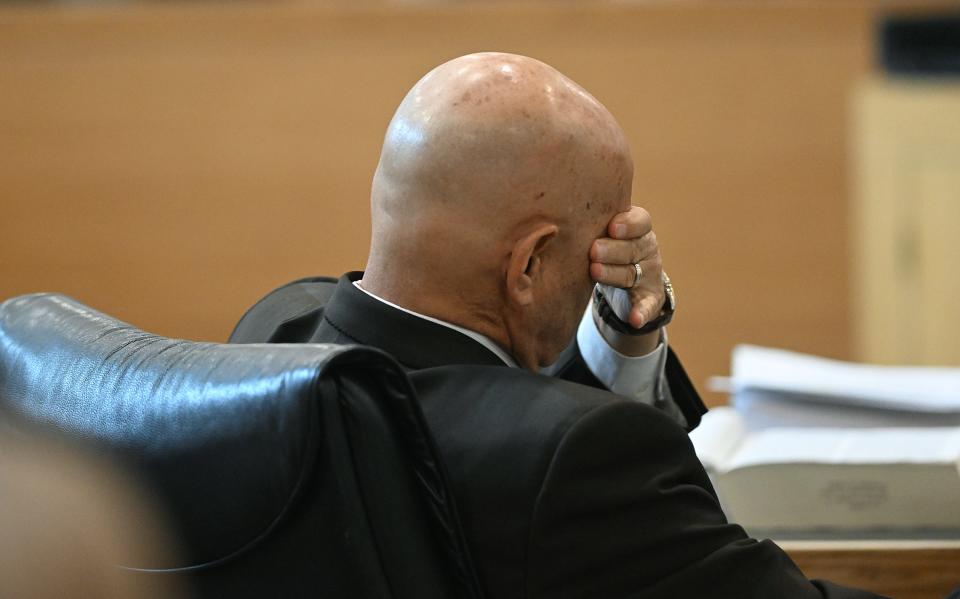Ashley Benefield trial: Defense rests their case, call mental health counselor
The defense for Ashley Benefield, a former ballerina accused of killing her estranged husband in her mother's Lakewood Ranch home in September 2020, rested their case Monday.
Ashley Benefield, 32, is charged with second-degree murder with a firearm for the shooting death of her estranged husband, Doug Benefield. She was arrested a little more than a month after the shooting in November 2020.
The former ballerina testified Friday that she fired her gun in self-defense for fear of her life. Amid breakdowns while on the stand, Ashley Benefield detailed how her four-year tumultuous marriage to Doug Benefield following a whirlwind 13-day romance ended with her pulling a gun from a storage pin in her bedroom and firing the gun multiple times in a panic.
Defense attorney Neil Taylor called seven witnesses Monday, including a shooting reconstructionist, a former Miami-Dade medical examiner and a licensed mental health counselor.
Ashley Benefield trial: Psychologist, Manatee County detectives testify
Keep reading: Murder trial of former ballerina Ashley Benefield begins in Manatee County
Mental health counselor explains domestic violence symptoms

A former Gainesville police officer and current mental health counselor, Bruce Ferris was the first witness called to the stand Monday morning and is an expert in domestic violence.
Ferris explained that a majority of domestic violence abusers are men, however, women can also be abusers.
The abuse that comes from domestic violence can be characterized using a tool known as the Duluth Wheel of Power and Control, which breaks down the types of abuse that could be used against a victim.
“The whole idea of the use of the wheel is to get compliance by the abuser with their victim,” Ferris said. “So, they’re looking to control them and either they use those criminal (statutes), [such as] battery, or they use emotional abuse or intimidation or these different techniques to try to control them. So the victim of domestic violence is placed with wanting to have the least harm to them.”
Which is why in many cases, victims will report walking on eggshells around their partners, or going along to get along so as to not incur abuse, Ferris said.
In case you missed it: Ashley Benefield case dubbed 'Black Swan murder trial' by media. What does that term mean?
More coverage: New College's president, lawyer attend Ashley Benefield trial. Here's what to know
Ferris explained the eight parts of the wheel include: using intimidation; emotional abuse; isolation; minimizing, denying and blaming; using children; using male privilege; using economic abuse and using coercion and threats.
Ferris explained to the jury that abusers can be anyone from all socioeconomic walks of life, and their motivation is that they want to control their partners. They have an ownership-type attitude, lack empathy, tend to see people as objects and that they also abuse pets, Ferris said.
Ferris said that victims will often hide the abuse from family and friends because they’re afraid the abuser will hurt them. He added sometimes people don’t even understand they’re victims of domestic violence.
Taylor went through a list of “hypotheticals” — seemingly describing acts that Doug Benefield had allegedly done like shooting a gun into a ceiling to intimate his wife to stop talking, punching their dog in the face, cursing and humiliating his wife and placing a tracker on her car — and asked Ferris if they were consistent with abuse. Ferris answered yes.
When Assistant State Attorney Rebecca Freel asked about several examples and whether they were consistent with a victim mentality like making excuses, not reporting, dropping charges, not standing up for themselves and not leaving their abusers. Ferris agreed that all were consistent with a victim mentality.
Family attorney states psychological report wasn't to be released Sept. 30
Faith Brown, a family law attorney who represented Ashley Benefield during the injunction case in 2020, appeared in court Friday morning.
Taylor called Brown in an attempt to discredit Stephanie Murphy's testimony about when a psychological evaluation report was expected to be released. Murphy, who represented Doug Benefield in family court for the injunction, was called by the prosecution to answer questions that would show the jury Ashley Benefield's motive for shooting her husband.
Ashley and Doug Benefield agreed to be evaluated by Dr. Brad Broeder, a local psychologist, who interviewed the couple separately and individually as part of a mutual agreed mediation. The prosecution has claimed the report was going to be released on Sept. 30, which would then reveal to Doug Benefield that his wife had no intention of reconciling their marriage despite giving that impression while they were together.
Brown read an email chain between her, Murphy and the family court judge's judicial assistant about setting up a date for the report to be released.
Brown said that the hearing for the report was potentially going to be scheduled for Sept. 23, with both attorneys, Broeder and a representative for Manatee County Children services needing to be present. However, Broeder would have been unavailable that day.
While there was an injunction hearing set for Sept. 30, the email chain stated that only the injunction against domestic violence was supposed to be heard that day. When asked if there was any chance the report was to be released, Brown gave a firm no.
Gabriela Szymanowska covers the legal system for the Herald-Tribune in partnership with Report for America. You can support her work with a tax-deductible donation to Report for America. Contact Gabriela Szymanowska at gszymanowska@gannett.com, or on X: @GabrielaSzyman3.
This article originally appeared on Sarasota Herald-Tribune: https://www.heraldtribune.com/story/news/crime/2020/11/05/manatee-county-woman-accused-killing-her-husband/6172324002/

